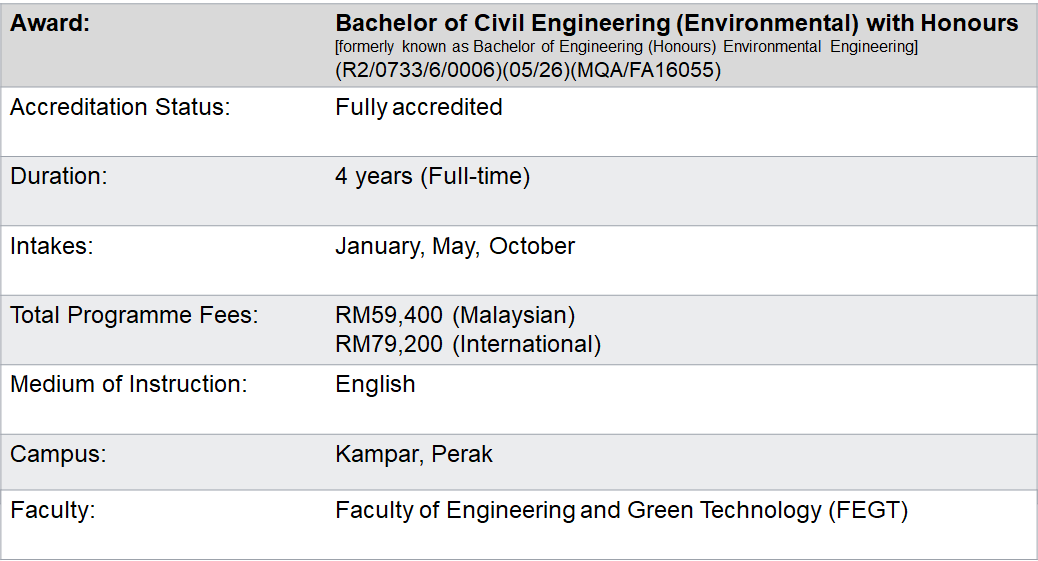Bachelor of Civil Engineering (Environmental) with Honours [formerly known as Bachelor of Engineering (Honours) Environmental Engineering]
(R2/0733/6/0006)(05/26)(MQA/FA16055)
Four Year Engineering Degree Programme
Accredited by EAC
Apply Now Department Page








- Board of Engineers Malaysia (BEM)
-
1. A pass in STPM with minimum Grade C (GP 2.00) in any 2
2. Credit in 1 Science subject at SPM level / equivalent qualification*
OR
1. A pass in STAM with a minimum grade of Jayyid
2. Credit in 1 Science subject at SPM level / equivalent qualification*
OR
1. A-Level with minimum grade D in any 2 subjects
2. Grade C in 1 Science subject at SPM level / equivalent qualification*
OR
1. SAM with Australian Tertiary Admission Rank (ATAR) 70 and Grade B in any subjects.
2. Credit in 1 Science subject at SPM level / equivalent qualification*
OR
1. CPU with an average of 70% in 6 subjects
2. Credit in 1 Science subject at SPM level / equivalent qualification*
OR
1. UEC with Grade B in 5 subjects
2. Credit in 1 Science subject at SPM level / equivalent qualification*
OR
The TVET diplomas such as Diploma Kemahiran Malaysia (DKM) / Diploma Vokasional Malaysia (DVM) / Diploma Lanjutan Kemahiran Malaysia (DLKM).
1. The DKM/DVM/DLKM must be fully accredited by MQA.
2. Required a minimum CGPA of 2.50 or CGPA 2.00 with at least 2 years working experience in relevant field subject to Senate / Academic Board’s approval.
3. Students will be required to pass the admission screening process conducted by the faculty and undergo the bridging programme, if necessary, during the period of their study in addition to the existing curriculum structure.
4. Credit transfer can be considered on a case-to-case basis and subject to existing credit transfer policies which are in effect.
-
Bachelor of Civil Engineering (Environmental) with Honours (R2/0733/6/0006)(05/26)(MQA/FA16055) is aimed to produce:
Mapping between University's mission and PEOsPEO1 Analyse and relate broad knowledge of OSH and environmental health concepts and principles, incorporating technical skills in OSH and environmental health practices PEO2 Commit to taking responsibility and delivering assigned tasks when leading, interacting and communicating with peers and stakeholders while ensuring ethical practices and orientation towards SDGs PEO3 Demonstrate technical competency in the innovative and creative use of digital technology and numerical techniques in OSH and environmental health PEO4 Commit to life-long learning and exhibiting entrepreneurial skills for academic and career advancement in relevant industries Mission PEO1 PEO2 PEO3 PEO4 Universal values in our beliefs ✓ Tenacity and resilience in overcoming challenges ✓ Agility in facing new frontiers ✓ Responsibility and commitment in pursuit of excellence ✓ -
The Programme Outcomes refer to the attributes that students should possess at the point of their graduation. These programme outcomes are as follows:
PO1 Relate/Connect and explain knowledge in OSH and Environmental health at the workplace. PO2 Assess and analyse issues and conduct research on OSH and environmental health at the workplace. PO3 Interpret, analyse, synthesise and apply evidence-based scientific principles in discussing ideas of preventive and corrective measures in OSH and environmental health. PO4 Educate and train employees, employers and other interested parties on OSH and environmental health. PO5 Adhere to the legal ethical principles and the professional code of conduct in OSH and environmental health. PO6 Utilise digital applications and information management systems to enhance their OSH and environmental health practices as well as to seek and process data related to work. PO7 Demonstrate skills to use and interpret routine and complex numerical and graphical/visual OSH and environmental health data. PO8 Assume responsibility in leadership, communication and interaction in carrying out routine and non-routine OSH and environmental health tasks. PO9 Select self-improvement initiatives and possibilities for further education related to OSH and environmental health. PO10 Explore and engage in activities relating to entrepreneurship. PO11 Show commitment and responsibility in complying with any organisation and professional ethics. -
Click the links below for more information.
Programme Brochure General Information Brochure UTAR Studies Page Application Page Financial Aid -
For academic enquiry on the course information, please contact:
Assoc. Prof. Dr. Zafarullah Nizamani
E-mail: zafarullah@utar.edu.my
Tel: 05-468 8888 ext: 4638
For general course enquiry, please contact us via our programme promotion team.
